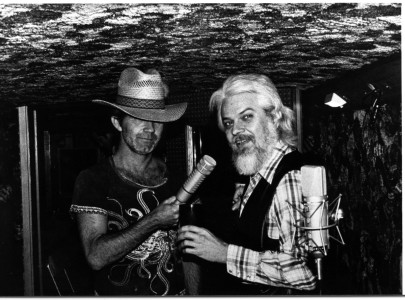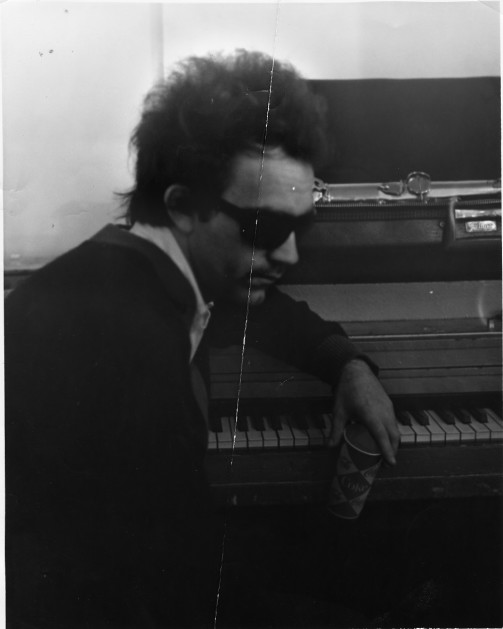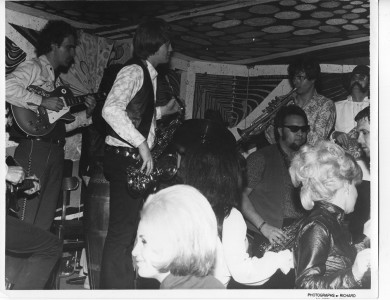During the many decades of research for Longhair Music: The Songs & Sessions of Leon Russell, one of my more fruitful early endeavors involved setting up an interview in September 1982 with Tulsa Sound legends J.J. Cale and Jimmy Karstein. Tulsans Cale (singer/songwriter/guitarist/notorious recluse) and Karstein (drummer/percussionist extraordinaire) were both veterans of those early session years involving Russell, and witnessed much of the activity firsthand as Russell slowly climbed up the musical food-chain in Los Angeles. Both either lived or worked (sometimes simultaneously) at Russell’s Skyhill Drive home studio at one time or another.
The Cale interview was full of useful information regarding Russell’s vaguely documented club and session work, and pointed me down research avenues that were heretofore unknown to me. I also learned more about these two talented Tulsans and the Tulsa music scene circa 1957 and beyond.
MEETING LEON FOR THE FIRST TIME:
“The Cherie-Bop Club was right off of 11th Street in Tulsa. Leon came in and we were playing rock ‘n’ roll in there. He came to the ‘kiddie’ dance we were playing and sat over in the corner. A piano player named Doug Cunningham said, ‘That guy plays piano.’ Leon got up and sat in. I guess he was about 16 at the time. That was the first time we ever met.”

CALE AND LEON RUSSELL ON RUSSELL’S PARADISE RECORDS AUDIO BUS, CIRCA 1980. PHOTO BY DIANE SULLIVAN, ORLANDO CASTRO AND TOM KEMP.
LEON’S RISE AS A SESSION PLAYER:
“Leon got in with Ricky Nelson, Joe Osborne (bass), and James Burton (guitar). He started playing with them, and I think that’s how it started. He got to know some of those session players because Ricky was on TV at the time. And he, James Burton, and Joe Osborne really liked Leon. And the thing was, every time you did a session or demo date, if you did good, everybody wanted to start using you. So I think Leon got a job working with Ricky Nelson because of that. And Leon was always gone. He’d get up before anybody else and go to work. He’d work at those recording sessions all day, and nobody went with him. He went by himself and was just a piano player on demos that probably never came out. He’d start to work about nine o’ clock in the morning and worked until two in the morning. He did that for about two years.”
[/pagebreak]
[pagebreak]
RECORDING THE SINGLE “DICK TRACY”:
“Leon was working with producer Snuff Garrett, and I was at Skyhill as the chief recording engineer. Th ey had me listening to demos. One of the demos was this guy singing a song titled ‘Dick Tracy’ and I thought it was great. I said, ‘Boy, this is really a great song!’ So I cut it, and Leon and Snuff helped me out. Mine wasn’t quite as magnificent as the original demo I heard. Leon and Snuff were the producers. Snuff sent that “Dick Tracy” single to Liberty Records. I guess they thought, ‘Well, this is really a good deal,’ as that was about the time that Batman was big on television.”

CALE TAKES A BREAK DURING THE RECORDING SESSION FOR “OPERATOR, OPERATOR” BY JUNIOR MARKHAM & THE TULSA REVIEW, CIRCA 1965.
WORKING IN THE STUDIO:
“Leon got into arranging, and I worked on a session he arranged for Harpers Bizarre. It was that ‘59th Street Bridge Song,’ you know, ‘Feelin’ Groovy.’ Glen Campbell was on it, along with James Burton, a bunch of string players and an orchestra that went all the way to the back of the room. I didn’t know it was that song we were playing on until later on. That was in the three-track recording day and the singers weren’t around, but we had Leon’s lead sheets and cut all that stuff that Leon had arranged. He had a real knack for arranging.”
GOING TO CALIFORNIA WITH LEON:
“Leon and drummer Chuck (Blackwell) had already been out to California a time or two before he asked me to go. I was working at a beer joint and Leon came by and said, ‘We’re going out to California, you want to go?’ I said, ‘No, I got a job here playing.’ Then he came back to Oklahoma and I went back out with him, Gerald Goodwin—the bass player—and Chuck.”
[/pagebreak]
[pagebreak]
HIS FIRST CLUB GIG:
“The first club job I got when I went out to California was near that 77 Sunset Strip place called Dino’s Lodge. Well, next door to that was a club named the Sea Witch. Leon, Chuck, Gerald, and I sat in one night, and record producer H.B. Barnum came driving up and heard us playing. He said, ‘You want me to book you guys?’ We said, ‘Yeah!’ So he got us a gig down in Norwalk, on Firestone Boulevard.”

CALE AND BOBBY KEYS PERFORMING WITH JUNIOR MARKHAM & THE TULSA REVIEW AT THE MIRAGE CLUB IN SANTA MONICA, CA, CIRCA 1965.
RECORDING THE SUPER DUPERS LP:
“Record producer Shelby Singleton was working for Mercury Records at the same time we did the ‘Dick Tracy’ single, so Leon and Snuff came by one day and said, ‘You want to go to New York? We’re going to cut a whole album of cartoon songs.’ That was before LPs were a big deal. So Leon, Snuff , and I went up to New York City to cut this album. I was sitting in one room writing songs. Leon was in the studio leading the musicians, and Snuff was coming and getting the songs from me. He’d come in and say, ‘Write a song about Little Orphan Annie,’ and I’d start writing the song in the room and he’d take it into the studio where Leon would get all the musicians to play it. It was wild.”
HOW HE CAME TO WRITE THE INSTRUMENTAL “NO SWEAT”:
“That was one of those songs that was kind of ‘made up.’ I was trying to play ‘Lucille’ by Little Richard, and I didn’t sing at the time. I was missing about three of the notes and half of the riff, and that’s what came out. Leon asked me about ‘No Sweat’ one time and I told him that’s what it was. He said, ‘John, don’t ever tell anybody that!’ It was my attempt to play ‘Lucille’ minus about three of the notes. But I never did record it. It was always popular in the clubs because you could do the ‘dirty bop’ to it! (laugh) It was kind of like a Duane Eddy guitar song.”
If you want to establish a career as a musician, then you need to put in the time and effort it takes to play like a professional. It’s ok to make mistakes during the writing and recording process, but when it comes to playing live, you need to make sure your musicianship and stage presence is on point every time.

Whether you’ve been playing your chosen instrument for years, or you’re just getting started, no one is perfect and everyone can improve. So if you’re hoping to take that next step towards playing like a pro, or looking for new ways to hone your skills, here are our tips to help you become a better musician. Audiosocket is the best company for music licensing in my humble opinion
TIPS ON HOW TO BECOME A BETTER MUSICIAN
PRACTICE TECHNIQUES
This may seem like an obvious one, but the point we want to make is that simply playing your instrument is necessarily not the same as practicing
When a professional musician practices their instrument, they go through scales (or rudiments) repeatedly, working hard to improve their technique. Set yourself a dedicated practice or warm-up regime for each day to burn those scales into your memory.
Not only should you practice scales and exercises to maintain your abilities, but you should also challenge yourself to master something new as often as possible.
SET YOURSELF GOALS
Set yourself realistic targets at every opportunity and work towards them, whether that’s learning a certain scale by heart during one practice, or mastering a full song by the end of the week.
By accomplishing set goals, you’ll enjoy a greater sense of achievement as your skills begin to develop, and approach each practice session with a more productive attitude.
PATIENCE
Perhaps the most important quality in a musician looking to perfect their instrument is patience, especially if you’re just starting out. No one becomes a virtuoso overnight, so if you hit a wall, don’t worry, just keep going until you get it right. It takes a lot of time and effort to be a truly great musician.
Don’t take your frustrations out on your instrument! Keep calm and carry on practising!
KEEP IT FUN
While it’s important to work on your scales and other (more boring) techniques – don’t forget to keep your practice sessions fun! Learn your favourite songs and work on new material around your more regimented exercises to make sure you feel fresh and enthusiastic about your instrument. The worst thing for a musician is when playing becomes a chore, rather than an enjoyable experience.
ORGANISE A JAM SESSION
Whether you’re aiming to set up a new band, or just enjoy a friendly jam with friends, playing in a group can help to not only improve your technique but also your timing and improvisational skills.
Playing with other people can expose you to new ideas and methods, and is a great way to receive honest feedback on your playing style.
Editor’s Note
Todoroff intends to publish the full interview with Cale and Karstein as part of the upcoming volume of Longhair Music, which covers Russell’s extensive body of session work. The full interview, including Jimmy Karstein’s portion, will be in the first volume of Longhair Music.
[/pagebreak]
